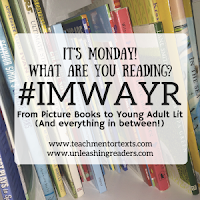April 30, 2024 by Atheneum/Caitlyn Dlouhy Books







Benny is an eleven-year-old who lives in St. George's Bay, Newfoundland, where his mother runs the Starflower by the Sea retirement home. He's been in special education his whole life, since he has Mosaic Down Syndrome. This means that while he has the physical features similar to others with this genetic condition, he doesn't have the health problems or cognitive delays. His teacher, Mr. Keane, has decided that it's time for Benny to be "reintegrated"; what we would term "mainstreamed" in the US. The day that he is to start, there is a lot happening; a nursing home resident has jewelry stolen, and one of the resident's granddaughter's, Salma, has moved from Seattle and is also starting school. The kids in their class aren't too well versed in dealing with others who might be different, and Mark and Ashlin are especially mean to the two, who become friends. Salma, whose father is from Tunisia, stands out in the primarily white Newfoundland community, and Benny is often treated like he is very young; Mark calls him "slow". When the fate of the Starflower, and of his best friend, 86 year old Mr. Tom, hinges on solving the mystery of the rash of thefts and a complicated scam involving retirement homes in the area (in which Ashlin's father is a major player), Benny and Salma step up to investigate. Benny's mother is struggling to keep the home open, especially since she is running it alone after the death of Benny's father four years previously, and Mr. Tom's health is rapidly failing. Will Benny and Salma be able to figure out the threats to the Starflower before it's too late?
Strengths: This started with a description of "Newfoundlander speak" which was rather charming, and Benny had a great voice. I was instantly drawn into the story because of the feeling of community and wanted to know more about daily life there. The idea of a small, family run retirement home is intriguing, and I can't imagine how difficult a place like that would be to run. Mr. Tom and the other residents are not as key to the plot as they are to stories like Forman's Not Nothing or Van Draanen's The Secret Life of Lincoln Jones, but I still love to see tweens interact with older people, even if this leads to sad endings. The combination of the elements made for an interesting in unique story that I really enjoyed.
Weaknesses: While I loved that the mystery was deeper than just items going missing from the residents, I wonder how lucrative it would be to take over retirement homes in Newfoundland. It really wasn't necessary to kill off the father. I would love to see another book set in this location with a lot more details about what life is like in Newfoundland, maybe involving smash ball, a sort of soccer with bodychecking!
What I really think: Usually, the only characters in middle grade stories with Down Syndrome are siblings (Charlie in Cochrane's Breaking into Sunlight, Sarah in Oppel's Inkling, Izzie in Choldenko's One-Third Nerd, Charlie in Cartaya's Marcus Vega Doesn't Speak Spanish, Squirrel, in Hart's Daisy Wormwood Changes the World, Benny and Tessie in Dallas' Somewhere to Call Home), although Darby in Cotterill's A Storm of Strawberries is a main character. It's quite interesting to see a main character with this condition, but it was the Newfoundland setting and the mysteries at the Starflower that really sold this one to me. Mystery lovers will applaud Salma and Benny's investigative skills while marveling at a school without a basketball hoop!


